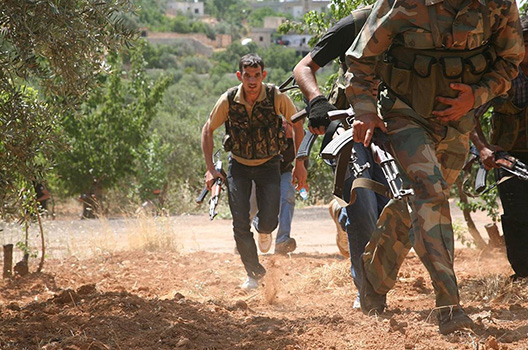
Supporting the Nationalist Opposition to the regime of Bashar al-Assad in Syria is critical to countering the Islamic extremist threat undermining the stability of the region, the author of a new report from the Atlantic Council said Tuesday.
Faysul Itani, speaking at a Washington forum, said a prime reason to do that is that the opposition “draws its support from the Sunni population” in the struggle against Assad.
Titled “Defeating the Jihadists in Syria: Competition Before Confrontation,” Itani’s report argues that the United States should not expect the opposition “to fight three, four, five rivals at once,” even if the eventual force of 15,000 is fully trained and equipped in the coming years. “I wonder what mandate they will be given” when they reach that status of manpower, training and equipping to fight and then govern.
Itani added, “We also need to stop making disparaging remarks about groups we support” in the conflict, now in its fifth year.
The last American ambassador to Syria, Robert Ford said, “We certainly didn’t ask [the opposition] to fight the Islamists” when they rose up against Assad. “We told them to quit working with them” in 2012.
In the panel discussion that followed, Richard Barrett, a former British diplomat and a member of the Soufan Group, said, “All the air strikes against ISIS [the Islamic State of Iraq and Syria and one of the Sunni jihadist groups] are doing is taking out machine guns, people on motorbikes.” He called the United States’ efforts in Syria “a policy of containment.”
He advised the United States, Turkey, and Saudi Arabia “to look at al-Nusra [another Sunni jihadist group, originally launched by al Qaeda in Iraq]” and learn from the successes it continues to have on the battlefield and in areas it controls.
But Ford said al-Nusra is losing support in some parts of Syria, especially the south, when it brutalizes residents, and also among opposition groups for no longer closely cooperating with them in the struggle against Damascus.
Barrett said the question, especially for Turkey and Saudi Arabia as they step up their military and financial support of the National Opposition, is “what is the day after Assad goes” to be like—a Syria split into parts, dominated by jihadists or tilted toward Shi’ite Iran and its Hezbollah allies in neighboring Lebanon.
“Is Syria like Iraq, likely to break up?” he asked. Barrett added the United States does not know if al-Nusra and ISIS are being drawn closer together now or are moving further apart in the continuing civil war and the American air intervention.
“Working with the Assad government [against the jihadists] is exactly the wrong approach,” Ford, now with the Middle East Institute, said. “It plays into Sunni narrative” that the United States is working with the Iranians to keep the negotiations on its nuclear program on track. He added that at some point the United States, its partners, and the opposition will have to talk “to some Islamists” and elements of the Assad regime.
That also means that the opposition “needs to reach out to elements of the regime” to show “them there is a third way” other than Assad or the jihadists—something they did not do in failed peace talks in Geneva two years ago.
“Washington is in bad, bad need of a strategy. There needs to be a new government in Syria,” he said. Ford cited Iraq as an example of that, when its parliament replaced Nouri al-Maliki as prime minister to change the political dynamics of the struggle against jihadists there. But “we don’t have the tools to make this happen in Syria.”
While the Islamic State is able to pay its fighters four or five times what the opposition pays its force, “money is an allure, not a glue” that keeps men joining and taking to the field, Barrett said. He said it was commitment to an ideology.
“I still believe the calculus is pragmatism” to achieving stability in Syria and the region,” Itani said.
Right now, “I think negotiations . . . are going to be on the battlefield,” Barrett said.





